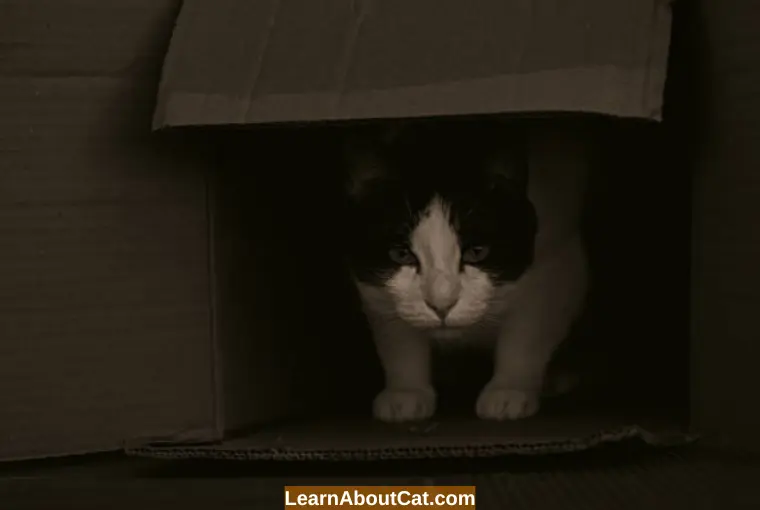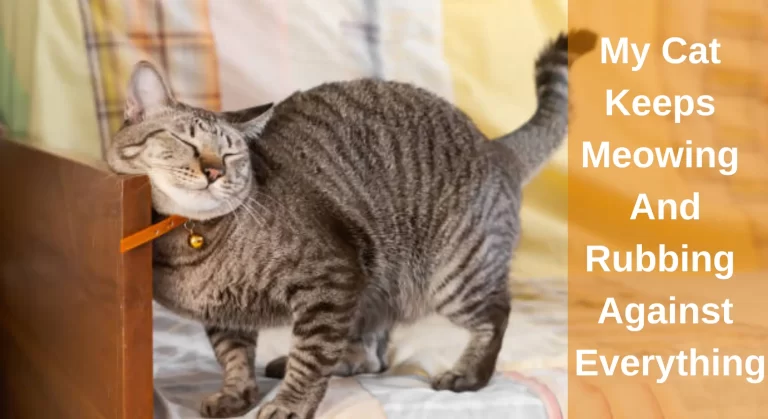How Long Will a Scared Cat Hide? Cat Hiding Behaviour Explained
Cats frequently become anxious and hide when they are exposed to unfamiliar individuals or circumstances. There are several potential causes for cats’ frightening behaviour. However, it may be perplexing for most cat owners when their felines continue to hide for a while. Moreover, most cat owners become worried and ask when their feline will come out and become normal.
Vets usually say that felines between the ages of 7-12 weeks old usually hide for around 5 hours, while the duration of time for which your feline hide will depend on its nature and the reason. The young feline will take a long time to become normal and to come out from its hiding. Furthermore, if you recently bought a new kitty and it gets scared, then it may hide for a couple of days.
Picky cats don’t like even the tiniest things, and even the smallest things easily throw them off. If your cat has been hiding in a spot for some time, this article will provide tips and tricks to help them come out.

Why Do Cats Hide?
Your feline will hide for a variety of reasons. Finding out why your felines hide will help you keep them normal when they feel threatened or uncomfortable.
Cats prefer habit and typically struggle with an alteration. As a result, if anything unanticipated or frightful occurs, they could become frightened and run away until they feel secure. It is entirely normal behaviour that serves as both a defensive mechanism and a coping mechanism under challenging circumstances. Cats cover for a variety of reasons, such as:
1. A New Visitor or Cat comes into your House
Your feline may hide if a stranger or an unfamiliar pet arrives at your house. Felines may become uneasy when visiting a clinic or doctor’s appointment and when guests are passing by your house.
Your feline may also experience competition or replacement when a second cat is living with them. Cats will also conceal when they require a private bathroom area, particularly if another pet is present.
2. Stomach problems or disorders
Felines frequently hide when they are sick because they are so emotional. They can even decide to avoid you when you attempt to nourish them. This may be because your feline might be facing stomach issues or other disorders, and she can’t tell you just like she always does.
If this is the case, give your cat a hot shower and meals that contain pumpkin or other digestion aids to improve her digestion.
Your cat may also be suffering from allergic issues when he’s frequently hiding or if it exhibits signs of weariness and anxiety. Additionally, cats frequently experience allergies that make them hide in shadowy areas, which makes them anxious.
They use hiding as kind of a form of self-expression under these circumstances because it gives them some desired lonely time.
3. Variations in Hormones
Usually, male felines get aggressive and irritated when exposed to female estrogen, which is called “catfight disorder”. It occurs when female felines experience a heat cycle and hunts for a male feline. The male felines feel female estrogen and may hide.
Naturally, cats that have been neutered are less prone to react aggressively when they smell a female feline that is in heat.
4. Continuous Birds or Pets’ Chattering or disturbing sound
Felines may appear to be the most self-reliant creatures, but they actually depend on their ears to determine whether they are in threat nearby and require calm space to evaluate.
They may become anxious if they hear the continuous and disturbing sound of other pets or birds. As a result, they search for a private place and hide themselves to feel secure.
You can stop that activity by draping scraps of aluminium foil across window panes and frames. As a result, your cat won’t hear such disturbing noises from outside.
How Long Will A Scared Cat Hide? How Long Does it Take for a Scared Cat to Adjust?

If they are scared outside, cats will hide for several hours to days, sometimes even for a week. It all depends on the cat’s personality and what makes it nervous. Also, if they’re scared to the extreme level, they may leave their territory and even food.
Following are some examples of different frights and how long a cat will hide:
Loud noises: Cats will experience short fear in response to loud noises or other abrupt shocks. Examples include a party, pyrotechnics, or nearby construction projects. They may remain hidden for up to an hour or until the chaos has subsided and they can find some calm.
New people: Moving homes are among the most traumatic situations for cats since everything is so foreign to them. Cats who have just moved may remain concealed for a few days while they become used to their new neighbourhood and residence.
Adopting a stray: Much like changing residences, adopting a stray cat may be rather daunting. Stray cats may conceal themselves for up to seven days because they aren’t even used to living in houses. They’ll start to hide less as they eventually become acquainted with their new environment.
Also, Check Out: Do Cats Pee When Scared Or Stressed?
Where Is My Scared Cat – Scared Cat Hideouts?
If there is a frightening situation outside, they will frequently choose a quiet location within your house. For instance, they could snuggle up beneath your couch. They will decide on a place where neither people nor animals can get to. Sometimes cats may hide in places that are higher, like the top of a bookshelf. The following are some instances of areas outside where your cat may be hiding:
- Among the shrubs or a tree
- On the building’s roof
- Under decks and porches
- In the garages or sheds of your neighbours
Unlike outdoor cats, indoor cats won’t become acclimated to living outside. As a result, they are more likely to be engaged in incidents like automobile crashes or animal conflicts. In this circumstance, locating your cat’s hiding area and bringing them inside could be a good idea.
How Do I Get My Scared Cat Out of Hiding?
Your cat will undoubtedly need some time to calm down and recover, but they can do this in the comfort of their own home. Here are some steps you can take to gain your scared cat’s trust

- Eliminate the cause of your cat’s fear by locating it. Most cats will remain hidden until the threat has gone.
- If you can locate the stressor immediately and remove it, your cat will hide less. If the threat cannot be eliminated, take care not to stress the situation out anymore. If your cat just has to worry about one thing, it will unwind more rapidly. You might also make an effort to block out the threat or utilise other calming methods, such as pheromone diffusers.
- Make certain your pet can escape. Cats typically flee and hide when they feel threatened and believe they have no other choice. Cats may escape most successfully by climbing upwards.
- Give him food packets as a reward when they are in hiding. The majority of cats won’t be able to resist the allure of food and will emerge from concealment, even if only briefly.
- In front of your cat’s hiding place, wave their favourite toy. Your cat’s natural instincts will probably cause them to come out of hiding.
- Another substance that some cats find difficult to resist is catnip. If you are aware that your cat likes and responds strongly to catnip. This has a calming effect and could reassure your cat.
What Can I Do To Prevent My Cat From Hiding in the Future?
The primary motivator underlying cats’ demand for seclusion is fear. In order to stop them from fleeing, you need, well, stop them from being terrified in the first place! If you maintain a calm home environment, your cat should hide far less frequently. Here are just a few suggestions you might use to make a safe area your cat would adore:

Give cats their privacy: Since they are independent creatures that value it. If they have a space that is exclusively theirs, they could go there to relax when they’re stressed. Cats might be prevented from hiding or running away by doing this. Cat towers and shelves are useful since they are raised and kept apart from other animals.
Remove stressors: Tensions must be eased in order to lure a cat out of hiding. You have to struggle to keep these pressures at bay once they have left your body. Each cat has a different collection of triggers, just like each person has a different set of worries.
How to Help a Cat Who is Hiding?
It’s normal for your cat to spend the majority of the day in hiding. The problem arises, though, when outgoing cats start to hide. This behaviour is typically an indication of stress, anxiety, a medical condition, or a combination of these. Here are some ways through which you can help your stressed cat.

1. Make a Secure Area for your Cat
Cats frequently experience fear when their normal routines or surroundings are disturbed or by strangers. When cats are scared, they frequently engage in predatory behaviours like hiding and running away.
2. Make an Appointment to See your Veterinarian
If your cat starts to hide and act more withdrawn than normal, it’s best to visit the veterinarian to rule out any medical issues.
3. Try to Normalise a New Environment
Another aspect of this stress is relocating. It could take some time for your cat to acclimatise to the new home; the more changes you make, the more difficult it will be for your cat to settle. If you strive to give your cat a feeling of normalcy in her new home, whether that means positioning her cat tree by a window or minimising clutter with empty boxes, it will be simpler for her to acclimate.
4. Keep an Eye out for Changes in your Cat’s Behaviour
Owners should pay attention when their cats hide since this might be a sign of illness or a potentially dangerous medical condition. If a cat begins to hide, the owner must pay close attention to the cat’s feeding, drinking, urinating, and faeces routines.
Good and Bad Hideout Spots
As long as the location is secure, it is often up to the cat’s guardian to determine whether or not to permit a cat to hide there. Try to provide your cat access to a different spot with similar features if there are any places you don’t want them to hide. Do they prefer cramped, dim settings? He’s secure and comfortable there; therefore, I’m okay with him staying there.

Avoid startling cats out of their hiding places, yelling at them, or squirting them with water in an attempt to scare them away since doing so will only make them fear you, hurt your relationship with the cats, and make them want to flee. Instead, you may install a door that kids can’t open to limit access to the hiding place. In the absence of a door, you may either fill the space with unpleasant-smelling aromas for cats, such as orange, peppermint, and cinnamon or lay down a vinyl carpet runner with its nubs pointing up.
There are a few locations that are NOT suitable for cat hiding places and pose serious risks to cats who may be seeking a warm place to hide. I’ve heard of cats getting electrocuted or killed while stuck inside dryers while hiding under a pile of heated garments that required more time to dry. Keep the door locked to your laundry room or closet so that your cats cannot access the machines. If your cat likes to laze around in cosy, warm apparel, you can now purchase cat beds with heating pads that only heat when there is pressure on them.
Additionally, you may provide your cats with amusing hiding spots that they won’t have to look for. For many felines, a cardboard box turned on its side with a cat bed inside will do, and you can place it just about anywhere. To instantly create a tent, you may also drape a blanket or towel over the seat of a chair.
Allow your cat to discover secure hiding spots, and keep an eye on these locations in case you need to locate your cat right away.
Is it Normal for a Cat to Hide All Day?
If you have moved into a new house or recently got a new cat and brought them home for the first time, it’s perfectly normal for your cat to hide all day. While they acclimate to their new surroundings, they could even withdraw for a few days.

Your cat could require medical care if nothing in their surroundings has changed, yet they are still hiding all day. When they are ill or hurt, cats tend to hide, so you should check on your cat as soon as you can.
Frequently Asked Questions
How long will a cat hide if scared outside?
In a situation where they’re not in their territory, it is easier for them to feel fear when they are displaced from their home. Displaced cats often hide for one or two weeks before returning home.
Do cats come back after being scared?
Take a deep breath, and do not panic. It is not uncommon for cats to disappear for days, return healthy, and look perfectly fine afterwards.
You might be worried, but they’re going to wander in and marvel at all the excitement. Wait a few hours before making a decision if they have not yet returned.
Should I be worried when my cat hides?
Usually, there’s nothing to worry about when a cat hides. Cats often hide when there is a danger since it is one of their favourite activities. They use it as a coping mechanism.
You only need to work to make things tranquil and, if it’s possible, get rid of the threat.
Where do cats usually hide when scared?
Cats frequently hide in washing areas, cellars, beds, and wardrobes. Their favourite hiding places are underneath and behind big things.
Always remember when cats get scared, they seem to run away from frightening noises and hide in quiet and calm places in your home.
Why is my new cat hiding from me?
It’s a natural response if your new cat or kitty hides from you. When your pet feels unsure, it’ll hide till they are assured that the place is secure and free from potential dangers.
As a result, when you initially introduce new kittens’ homes, it’s normal to watch them rush beneath the bed.
How long will a cat be scared?
It’s impossible to predict how much time it will require for your cat to recover from a traumatic situation and feel comfortable, protected, and prepared for engagement.
Try to be patient and give them enough time to warm up, whether the reason behind their fear is a loud noise, an overly friendly person, or an aggressive cat.
Should you force a scared cat out of hiding?
Never push your cat out of hiding; always give them space to come out by himself. They may consider you a threat if you force them to come out.
How long does it take a shy cat to trust you?
Kindly give your shy cat 3 months to settle, but be aware that some cats can require a bit longer. Your kitty will be thankful for your tolerance. Moreover, your kitty will definitely show its love to you once she gets familiar with you and its surroundings.
Final Thought!
How long will a cat run away in fear? Everything is based on how frightened your cat is. They typically stay covert until the danger has subsided. Or, if the change is permanent, they will remain hidden until they have acclimated to their new surroundings.
It would be best if you always let your cat do it, regardless of how long they conceal it. If you push them to leave, their anxiety will increase. They’ll make the decision to return on their own. You can only gently encourage them to emerge from concealment; they will ultimately do it independently. Only when an indoor cat is skulking outside or when you believe your cat could be unwell are there any exceptions.
Related Posts:
Who is Isabella?
My name is Isabella, and I am a dedicated and knowledgeable cat enthusiast. With years of experience caring for cats and a deep love for felines, I made a mission to help other cat lovers navigate the challenges of cat ownership.






